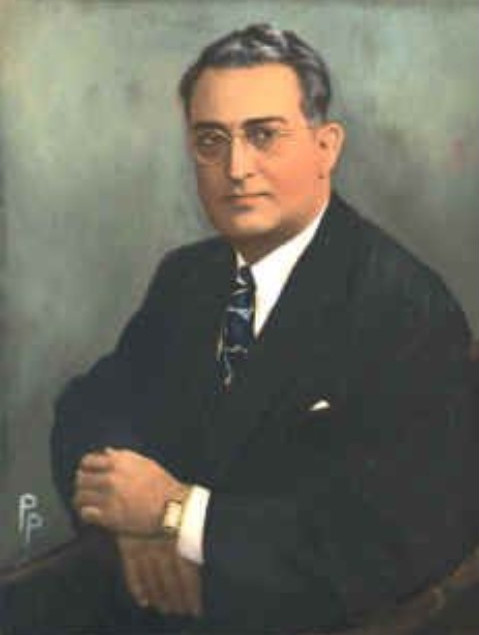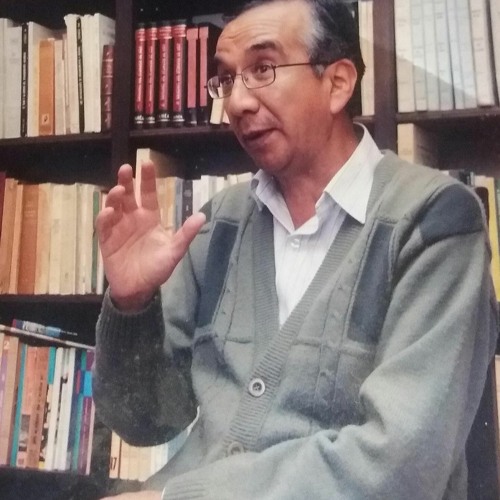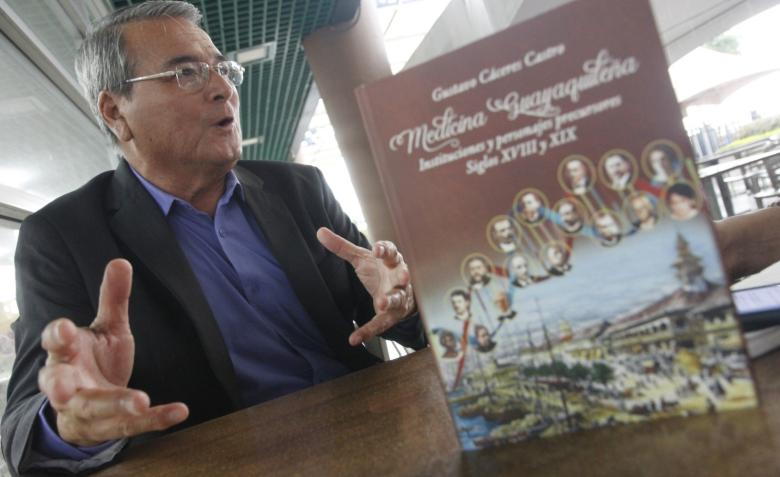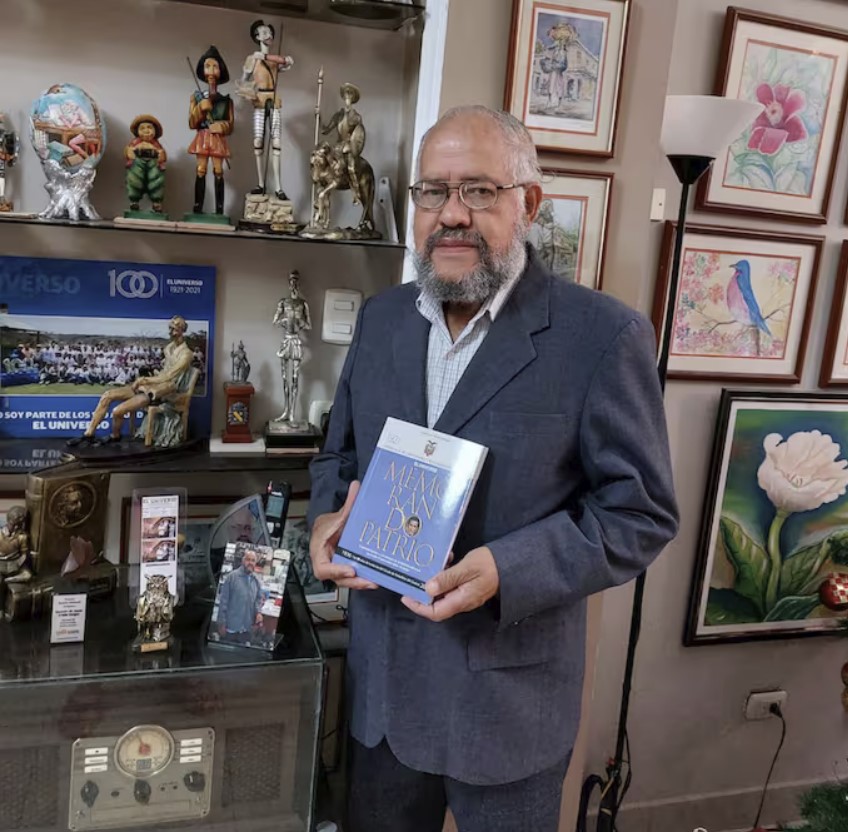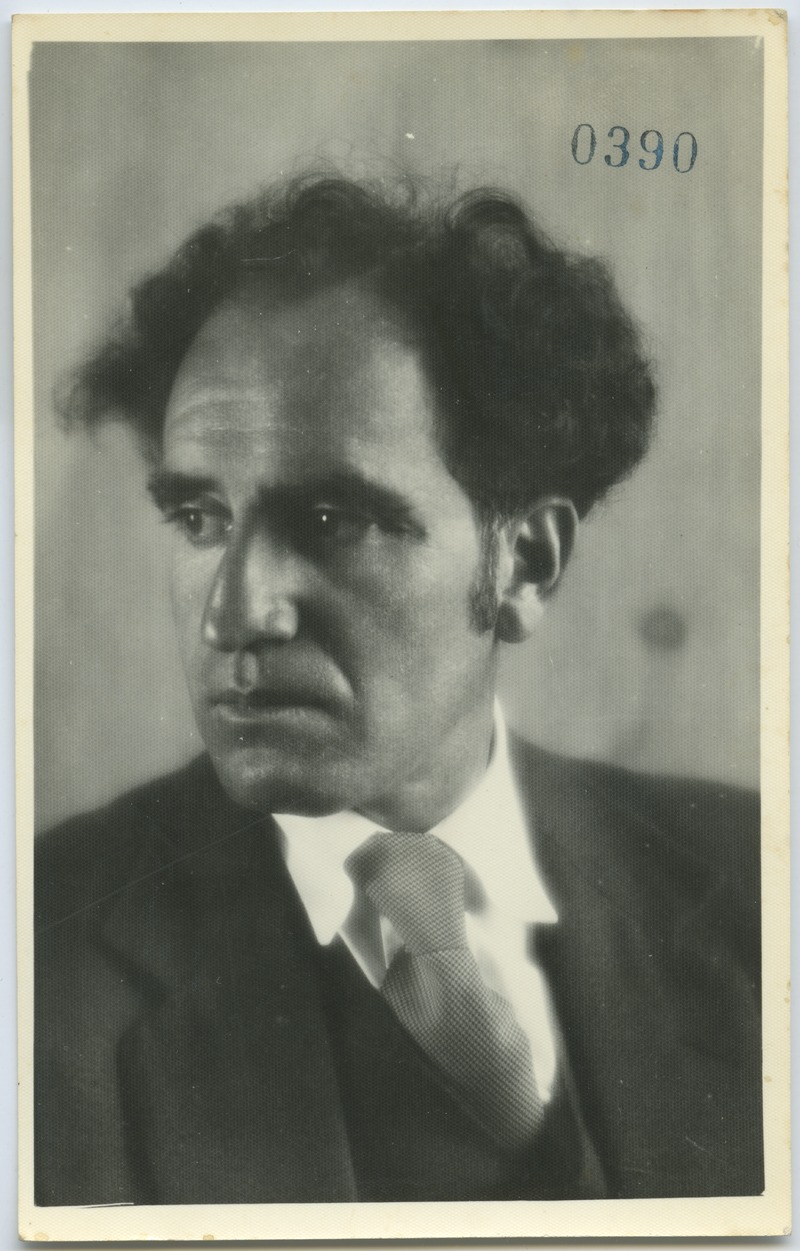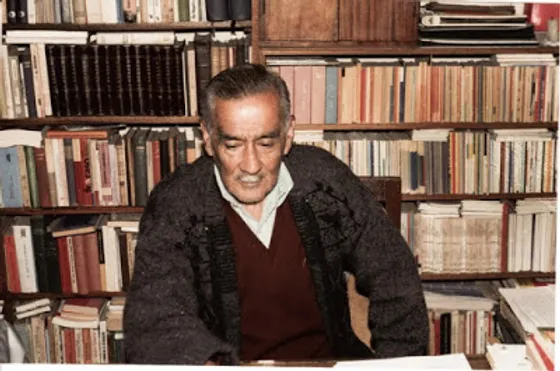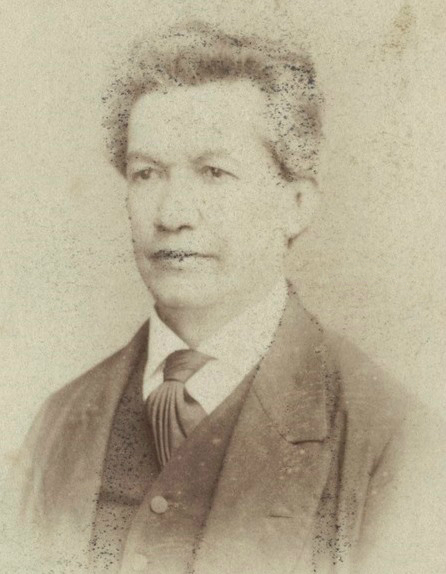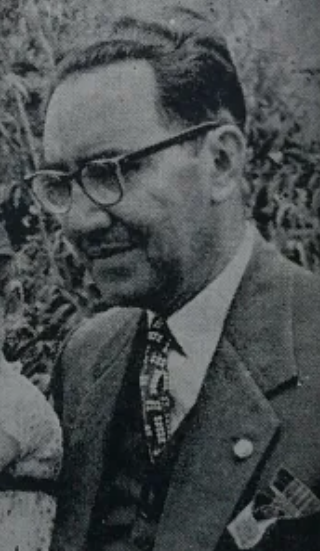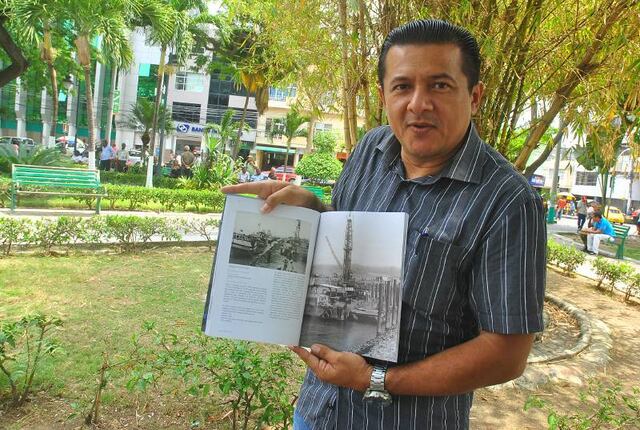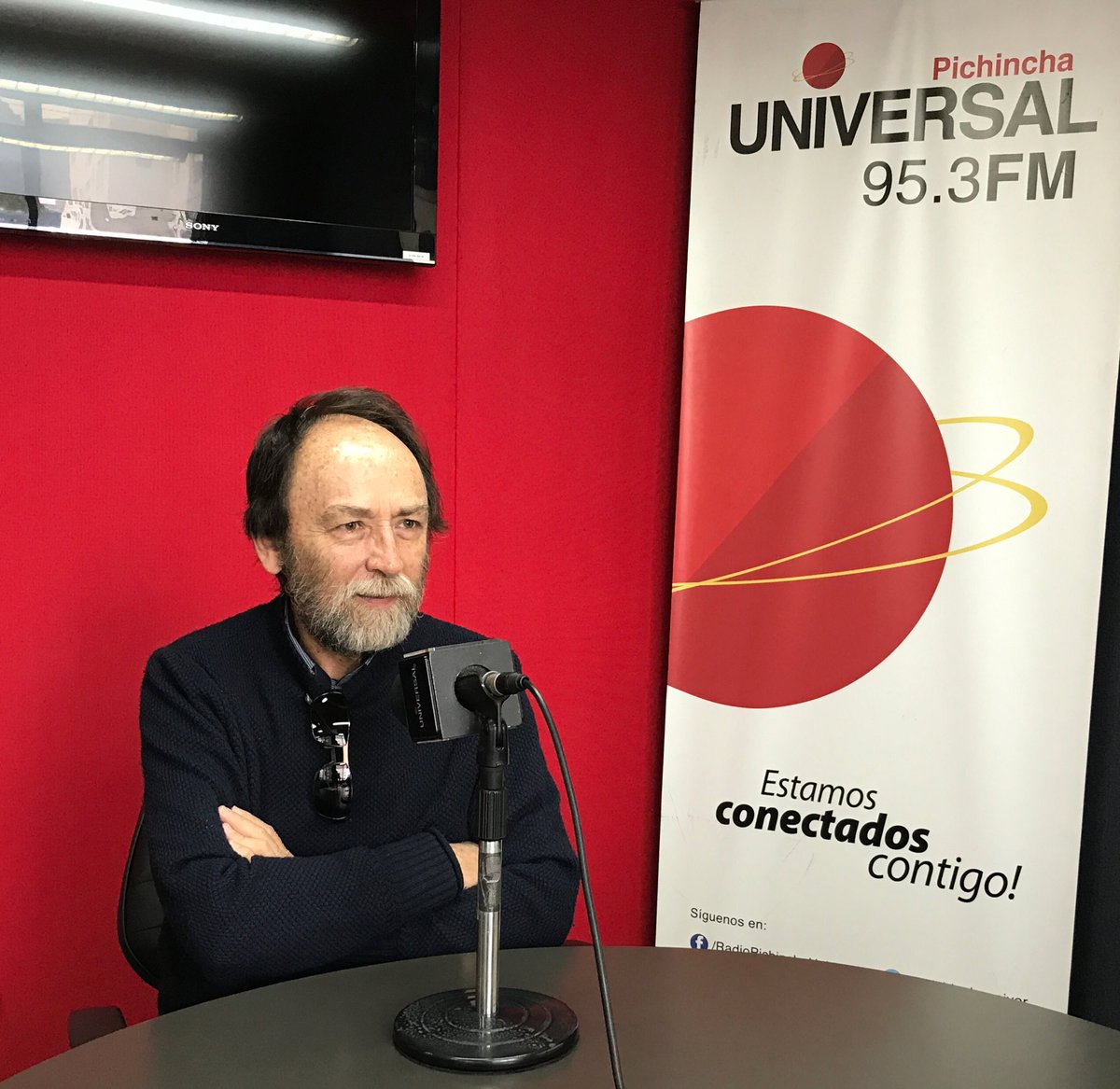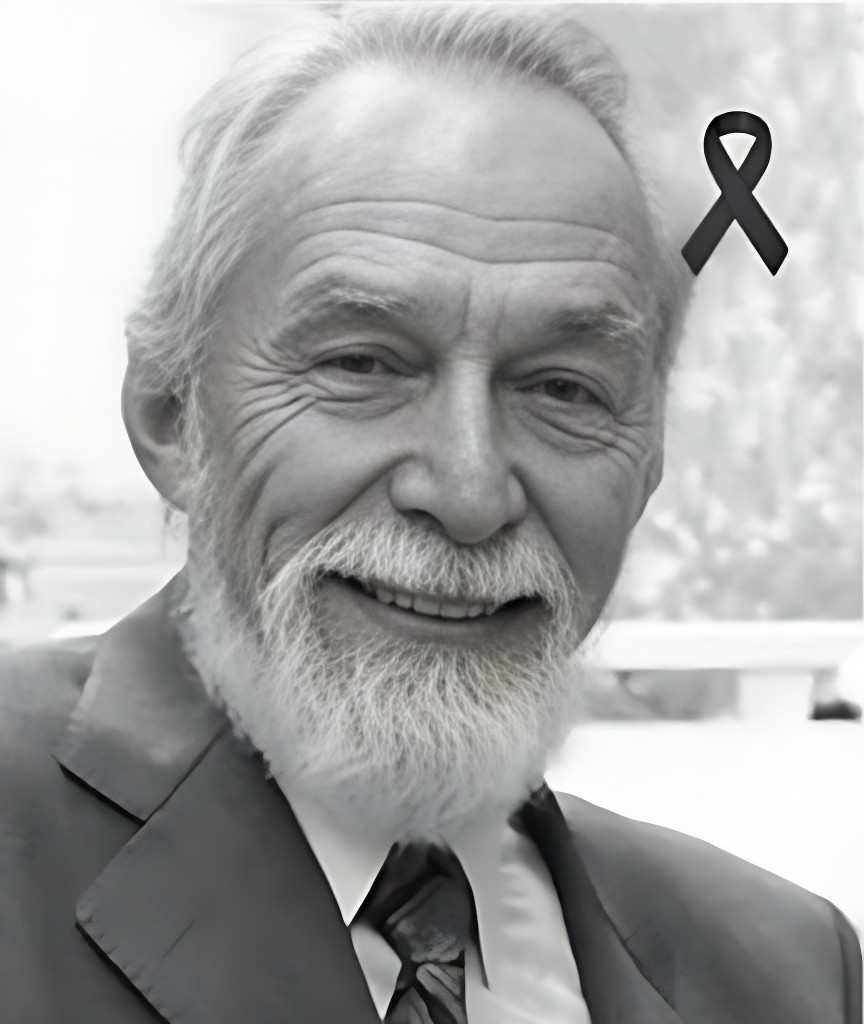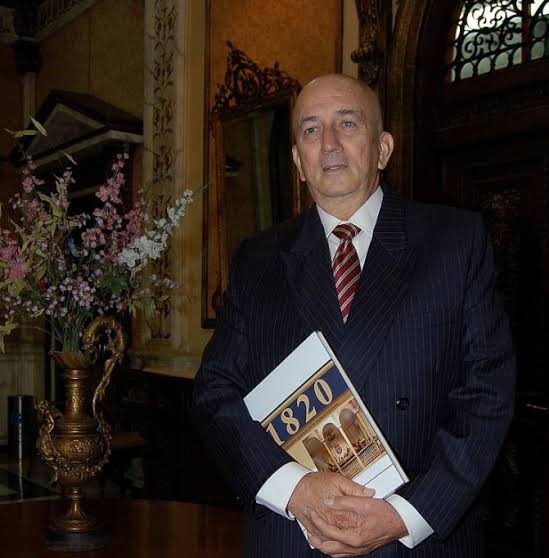Víctor Emilio Estrada Sciacaluga (Guayaquil, Ecuador, May 22, 1891 – Guayaquil, Ecuador, February 21, 1954) was a prominent Ecuadorian banker, economist, military strategist, author, and politician. The son of former Ecuadorian President Emilio Estrada Carmona, Estrada played significant roles in shaping Ecuador’s financial system, notably as General Manager of La Previsora and a key advocate for the establishment of the Banco Central del Ecuador. He briefly served as Minister of Finance, proposing the ambitious yet controversial “Plan Estrada,” and held various public service roles, including President of the Cantonal Council of Guayaquil. Estrada also made notable literary contributions, publishing influential works on economic policy and military strategy, cementing his legacy as a transformative figure in Ecuador’s history.
Continue reading “Víctor Emilio Estrada”Category: Historians
Edgar Freire Rubio
Edgar Freire Rubio (Quito, June 3, 1947) is an Ecuadorian writer, historian, anthologist, and renowned bookseller. Born in the historic San Roque neighborhood, Freire dedicated over four decades to promoting Ecuadorian literature and preserving the cultural memory of Quito through his work as a bookseller and writer. His publications, including the multi-volume Quito: Tradiciones, Leyendas y Nostalgia and El derecho y el revés de la memoria, combine meticulous historical research with a passion for storytelling. A self-taught scholar and advocate for the literary arts, Freire has been celebrated as “the bookseller of the city” and is regarded as a vital figure in the preservation of Ecuador’s cultural heritage.
Continue reading “Edgar Freire Rubio”Gustavo Cáceres Castro
Gustavo Cáceres Castro (Guayaquil, Ecuador, April 1954) was a prominent Ecuadorian physician, historian, and author known for his contributions to the history of medicine in Ecuador. A graduate of the University of Guayaquil’s Faculty of Medicine, he practiced at the Hospital Teodoro Maldonado Carbo and later taught embryology at his alma mater. Cáceres authored several influential works on Ecuador’s medical heritage, including Diccionario Básico de Terminología y Personajes de la Medicina Ecuatoriana (1989) and Medicina Guayaquileña (2023), which explore the evolution of medical practices and figures from the 18th and 19th centuries. His interests extended to poetry, winning him a first prize from the Municipality of Guayaquil in 1990, and his poem appeared in the anthology Cantos a Guayaquil (2011). Now retired, he remains a regular lecturer at the Archivo Histórico del Guayas, where he shares his research on traditional and scientific medical practices.
Continue reading “Gustavo Cáceres Castro”Ana María Goetschel
Ana María Goetschel Garzón is an Ecuadorian historian and professor emerita at FLACSO Ecuador. She holds a Ph.D. in Social Sciences from the University of Amsterdam and a Master’s in Andean History from FLACSO Ecuador. Her research focuses on the history of women, education, and gender studies, particularly exploring the origins of feminism and the role of punitive action in Ecuadorian history. She has authored several influential works, including Moral y orden: La delincuencia y el castigo en los inicios de la modernidad en Ecuador (2019) and Cartas Públicas de Mujeres Ecuatorianas (2013), and has received numerous accolades, including the Premio Manuela Sáenz in 2019.
Continue reading “Ana María Goetschel”Germán Arteta Vargas
Germán Arteta Vargas (Guayaquil, Ecuador, 1940) is a prominent Ecuadorian historian, journalist, educator, and author. Known for his dedication to preserving Ecuadorian history and culture, he has published several influential works, including Guayaquil nostálgico (2009), Cantos a Guayaquil (2011), and Qué chévere (2012). His writing often focuses on civic education, folklore, and national identity. In 2019, he was inducted as a Corresponding Member of the National Academy of History in recognition of his contributions to the historical and cultural heritage of Ecuador.
Continue reading “Germán Arteta Vargas”Rigoberto Cordero y León
Rigoberto Cordero y León (Cuenca, June 11, 1916 – Cuenca, August 1998) was an Ecuadorian poet, writer, and scholar whose work significantly contributed to the development of Ecuadorian literature. Known for his extensive body of poetry, biographies, and essays, his writings explored themes of music, culture, and national identity, and were translated into multiple languages. Cordero y León received numerous awards, including the Fray Vicente Solano Decoration, and curated anthologies that highlighted the richness of Cuenca’s literary tradition.
Continue reading “Rigoberto Cordero y León”Oswaldo Albornoz Peralta
Oswaldo Albornoz Peralta (Cuenca, May 8, 1920 – Quito, November 27, 2000) was an Ecuadorian historian, educator, and Marxist intellectual. Known for his critical works on Ecuadorian social history, Albornoz applied a Marxist lens to topics such as indigenous uprisings, labor movements, and the role of the church in Ecuador’s political development. He authored numerous influential books, including Historia de la Acción Clerical en el Ecuador (1963) and Bolívar: Visión Crítica (1990), and was a key figure in the Ecuadorian Communist Party. His contributions earned him national recognition, including an honorary doctorate from the Universidad Central del Ecuador.
Continue reading “Oswaldo Albornoz Peralta”Pedro Fermín Cevallos
Pedro Fermín Cevallos Villacreses (Ambato, July 7, 1812 – Quito, May 21, 1893) was an Ecuadorian historian, lawyer, and politician known for his significant contributions to the country’s historiography and legal system. A key figure in 19th-century Ecuador, he authored the six-volume Resumen de la Historia del Ecuador desde su origen hasta 1845 (1870; “Summary of the History of Ecuador from its Origin until 1845”), the first comprehensive account of the nation’s history. Initially a liberal, he later shifted towards conservatism and served as Minister of Government and Foreign Relations, as well as a Supreme Court judge. Cevallos was also the first president of the Ecuadorian Academy of Language, playing a vital role in Ecuador’s intellectual development.
Continue reading “Pedro Fermín Cevallos”Pablo Guerrero Gutiérrez
Fidel Pablo Guerrero Gutiérrez (Quito, Ecuador, November 1, 1962) is a prominent Ecuadorian musical historian, researcher, and author. With over 30 years of experience in the field, Guerrero has written more than 20 books on Ecuadorian music, including the comprehensive Enciclopedia de la música ecuatoriana. He studied at the Conservatorio Nacional de Música and holds a degree in Musical Pedagogy from the Universidad Técnica de Manabí. Guerrero is the founder of the Corporación Musicológica Ecuatoriana (CONMÚSICA) and has been recognized by the Academia Nacional de Historia for his extensive contributions to preserving Ecuador’s musical heritage.
Continue reading “Pablo Guerrero Gutiérrez”Augusto César Saltos
Augusto César Saltos Jarrín (Guaranda, December 18, 1899 – Guaranda, August 26, 1976) was a prominent Ecuadorian lawyer, writer, and cultural advocate. He served as a member of the Supreme Court of Justice and was deeply involved in social justice, advocating for the rights of workers and indigenous peoples. A co-founder of the Socialist Party in Ecuador, Saltos also participated in international peace conferences. He was a prolific author, known for his dramas, such as El Minero (1940) and Queriendo ser Grande (1943), which addressed social issues, and for works on Ecuadorian history and folklore, including El Cacique Huaranga (1969). Saltos led the Bolívar branch of the Casa de la Cultura Ecuatoriana from 1952 to 1970.
Continue reading “Augusto César Saltos”Irving Iván Zapater
Irving Iván Zapater (Quito, 1944) is an Ecuadorian lawyer, historian, and cultural leader. He holds a Doctorate in Jurisprudence with postgraduate studies in Economics from La Sapienza University in Rome and in History from the Pontificia Universidad Católica del Ecuador. A long-time professor and former Vice Dean at the Faculty of Jurisprudence at his alma mater, Zapater also served as Director of the Central Bank of Ecuador’s Center for Research and Culture (1981-1993) and led the National Council of Culture (1999-2000). He has authored several notable works on Ecuadorian history and economics, including La Vida de Cada Día and Imágenes del Ecuador en el Siglo XX, and was Director of the Revista Nacional de Cultura.
Continue reading “Irving Iván Zapater”José Páez Gracia
José Patricio Páez Gracia, an Ecuadorian author and historian, has emerged as a pivotal figure in documenting the rich history of Esmeraldas, a province in Ecuador. His book, “Esmeraldas del ayer,” published by the Ministry of Culture and Heritage and the National Institute of Cultural Heritage in 2019, spans 141 pages and is enriched with around 130 photographs. Páez’s work provides an insightful look into the region’s past, highlighting key historical events and figures such as Luis Vargas Torres and Eloy Alfaro. His dedication to this project, rooted in his family’s legacy of educators, showcases his commitment to preserving and promoting the cultural heritage of Esmeraldas for future generations.
Continue reading “José Páez Gracia”Roque Espinosa
Roque Espinosa Chávez (1951) is a distinguished historian and author, renowned for his in-depth and critical analysis of Latin American history, with a particular focus on Ecuador. His expertise is not limited to historical analysis; he has also made significant contributions in the realm of fiction, as evidenced by his work “Me descambias la vida,” which was honored with the prestigious Premio Joaquín Gallegos Lara. This recognition showcases his versatility and skill in both academic and literary domains. His work, characterized by meticulous research and theoretical rigor, has significantly contributed to the understanding of regional economic and social history. Notable publications include “Hacienda, comunidad y concertaje” (1986), “Parentesco y reproducción en Manabí” (1990), and “Las fronteras con Colombia” (2008). His book “Desmemoria y olvido: la economía arrocera en la Cuenca del Guayas 1900-1950,” a refined version of his Cum Laude doctoral thesis, stands as a testament to his scholarly excellence. This work delves into the rice industry in Ecuador, illuminating a previously understudied aspect of the nation’s economic and social history. Espinosa’s ability to intertwine economic data with cultural and social insights has not only enriched academic discourse but has also brought to light the lesser-known facets of Ecuador’s past. His dedication to uncovering and critically analyzing historical narratives has earned him recognition and respect in academic circles.
Continue reading “Roque Espinosa”Jaime E. Rodríguez O.
Jaime Edmundo Rodríguez Ordóñez (Guayaquil, April 12, 1940 – Los Angeles, USA, June 27, 2022) was a celebrated Ecuadorean-American professor, researcher, and historian. His work focused on the history of New Spain, Mexico, the Presidency of Quito, and the independence period in Hispanic America. Rodríguez Ordóñez’s notable contributions to historiography include his profound analysis of the impact of Spain’s Constitutional Monarchy and the independence movements in Latin America. His works, such as “Nosotros somos ahora los verdaderos españoles” and “The Forging of the Cosmic Race,” offer insightful reinterpretations of colonial Mexico and the emergence of Hispano-American identity. He held academic positions at prestigious institutions, including the University of California, Irvine, and was a member of the National Academy of History of Ecuador and the Mexican Academy of History. Rodríguez Ordóñez’s unique perspective on the interconnectedness of Hispanic America with global events during the Atlantic Revolutions significantly enriched the understanding of Latin American history and its complex journey towards independence and nation-building.
Continue reading “Jaime E. Rodríguez O.”Efrén Avilés Pino
Efrén Avilés Pino (Guayaquil, February 26, 1947 – Ibidem, December 31, 2009) was a renowned Ecuadorian historian, writer, and university professor. Educated at the University of Guayaquil, he significantly contributed to Ecuador’s historical research, emphasizing the Province of Guayaquil’s role in national independence. His acclaimed works include the “Enciclopedia del Ecuador” and “Historia del Ecuador.” Also notable in the music industry, Avilés composed the anthem for Club Sport Emelec. A member of the National Academy of History, he resigned amid controversies over historical perspectives. Honored with the Merit of Commandeur in 2002, his legacy in Ecuadorian history and culture is enduring.
Continue reading “Efrén Avilés Pino”
